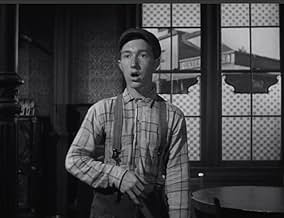Le célèbre tireur Jimmy Ringo se rend en ville pour trouver son grand amour, qui ne veut pas le voir. Il n'est pas venu chercher des ennuis, mais des ennuis le trouvent à chaque coin de rue.Le célèbre tireur Jimmy Ringo se rend en ville pour trouver son grand amour, qui ne veut pas le voir. Il n'est pas venu chercher des ennuis, mais des ennuis le trouvent à chaque coin de rue.Le célèbre tireur Jimmy Ringo se rend en ville pour trouver son grand amour, qui ne veut pas le voir. Il n'est pas venu chercher des ennuis, mais des ennuis le trouvent à chaque coin de rue.
- Réalisation
- Scénario
- Casting principal
- Nommé pour 1 Oscar
- 2 victoires et 2 nominations au total
- Townsman at Funeral
- (non crédité)
- Townsman at Funeral
- (non crédité)
- Street Loafer
- (non crédité)
- Street Loafer
- (non crédité)
- Indian Woman
- (non crédité)
- Pete's Pal
- (non crédité)
- Townsman at Funeral
- (non crédité)
- Townsman at Funeral
- (non crédité)
Avis à la une
This film is skimmed down to an absolute minimum with Gregory Peck as Jimmy Ringo, notorious killer and the deadliest shot in the Old West. Though his appetite for bloodletting is over, Ringo is forced to stay on the run from young ambitious gunners determined to shoot him down. After killing an upstart in self-defense, he escapes to the nearby town of Caynenne. There, he hopes to convince his estranged wife (Helen Westcott) to resume their life together, but his arrival causes a sensation. With more young bucks gunning for him, Ringo's fate lies in the hands of the sheriff (Millard Mitchell), his old bandit partner.
With this film the old credo, "less is more", is evident. No great showdowns, not much action, just Gregory Peck in a great character study with carefully built-up tension. He never let me down, giving a fantastic performance, again.
Camera Obscura --- 9/10
THE GUNFIGHTER is another superb western from a director not normally associated with the genre. Falling squarely between the 1940s and 1950s, I was at first uncertain at to which camp this film fell into. It has all the incidents you'd expect in a 1940s oater, but overlaid with the kind of psychology and sensibilities you'd expect in a 1950s western. In the end, I decided this is a film about contrasts.
The first contrast you notice is the visual one. The movie is shot in black and white and it seems that those were the only two tones available to director Henry King. The exteriors are bright, bleached out and hard on the eyes. The interiors are dark, cool and gloomy. There doesn't seem to be much shades of grey going on (of course, I could have been watching a bad print, but work with me, here ...)
This visual contrast is echoed by the contrasts between the characters. The first of these we see is the contrast between Peck's Jimmy Ringo and the dumb kid who challenges him in the first bar. Ringo tries to talk him round, the kid won't have it and goes for his gun. But Ringo - of course - is faster. Darwinism at work ...
The next telling contrast is between Ringo and his old compadre, Town Marshall Mark Street. While Ringo still drifts from town to town, occasionally having to show some punk who's fastest, Mark has gone respectable and settled down. Mark is a respected citizen while Ringo's presence causes mothers to call their children indoors.
Then there's the contrast between Peggy, Ringo's estranged wife, and the gossipping, prejudiced biddies of the town. Is it any coincidence that Peggy is a teacher, representing education and, by implication, civilisation?
THE GUNFIGHTER is very tightly plotted at just 85 minutes. It seems longer because of the wealth of incident it packed into its slender running time. Film makers of today could learn a lot about how to pace a story from films like this.
If it shows up on TCM or somesuch satellite/cable channel, do yourself a favour and make the effort to catch it. It's well worth your while.
It was Peck's idea for Jimmy Ringo to have a mustache--to Fox studio head Darryl Zanuck's disgust. Zanuck thought that moviegoers liked to see a clean-shaven Peck. The picture was not a box office success at the time, but it ranks among the Top 10 western films of all time in my book.
Le saviez-vous
- AnecdotesThe studio hated Gregory Peck's authentic period mustache. In fact, the head of production at Fox, Spyros P. Skouras, was out of town when production began. By the time he got back, so much of the film had been shot that it was too late to order Peck to shave it off and reshoot. After the film did not do well at the box office, Skouras ran into Peck and reportedly said, "That mustache cost us millions."
- GaffesWhen Marshal Strett first confronts Ringo, he brings three deputies with him. Later, when Deputy Charlie comes to sit shotgun, Ringo doesn't recognize him and asks the bartender, "Who is he?"
It was established that Ringo doesn't remember people from his failure to recognize the bartenders. It's easy to forget someone you've seen for only a couple minutes and weren't introduced to.
- Citations
Marshal Mark Strett: Somebody after you?
Jimmy Ringo: Three somebodies.
Marshal Mark Strett: The law?
Jimmy Ringo: Naw, this is personal.
Marshal Mark Strett: I don't want 'em to catch up with you here.
Jimmy Ringo: I don't want 'em to catch up with me anywhere.
- ConnexionsFeatured in Il était une fois l'Amérique (1976)
Meilleurs choix
- How long is The Gunfighter?Alimenté par Alexa
Détails
- Durée
- 1h 25min(85 min)
- Couleur
- Rapport de forme
- 1.33 : 1







































